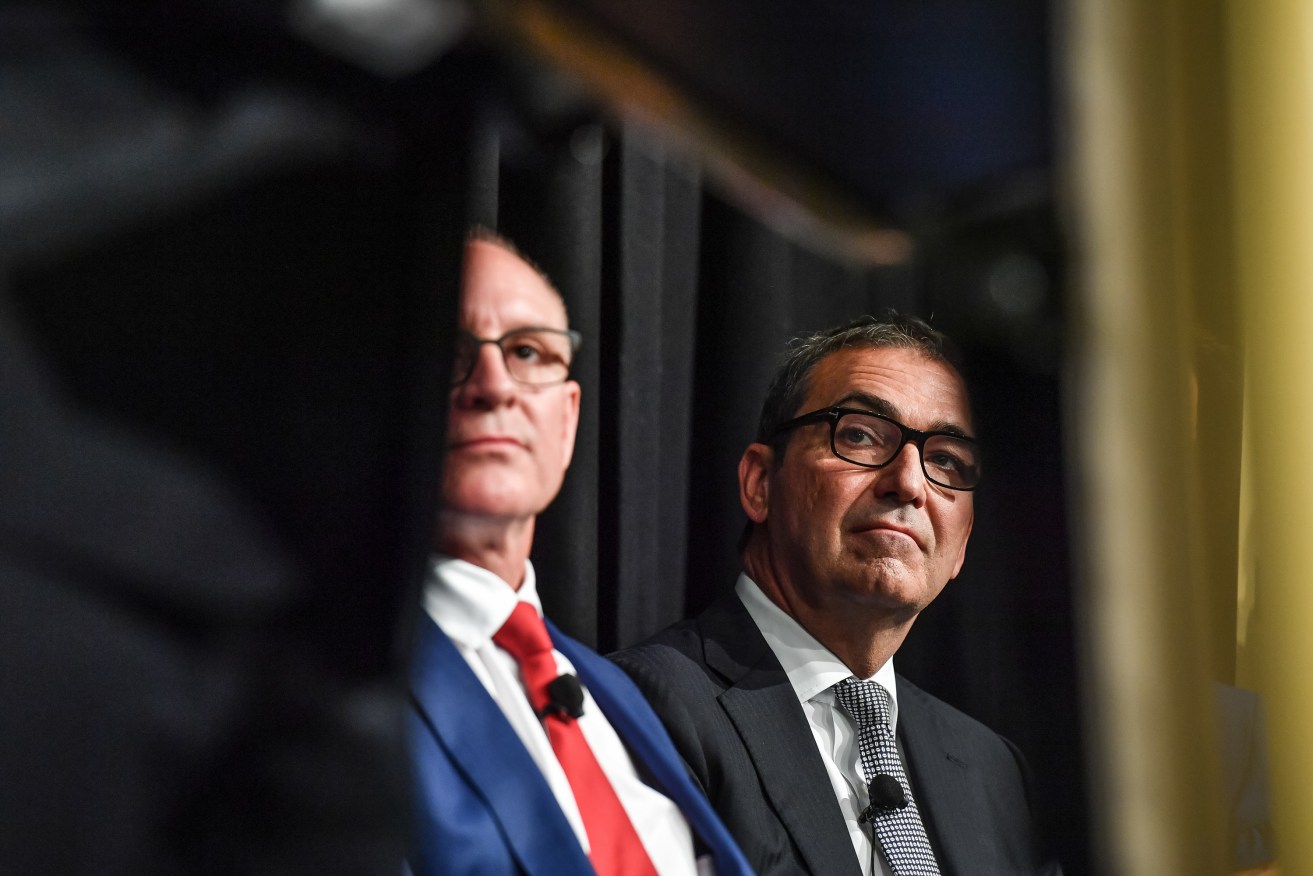Labor ‘not doing enough’ for Aboriginal housing
The head of South Australia’s peak housing organisation, Shelter SA, says Labor is trailing the Liberal Party on Aboriginal housing policy ahead of the March state election.

Shelter SA says Steven Marshall (right) has made out a more convincing policy on Aboriginal housing than Premier Jay Weatherill's Labor Party. Photo: AAP/Roy Vandervegt
In an open letter sent to all political parties and state election candidates last November, Shelter SA requested responses to five policy positions put forward by a group of housing and community service sector representatives.
These include the creation of an Aboriginal workforce development strategy, assurance parties would embed cultural competency in policy and service delivery, balances to ensure Aboriginal people would not “fall through the gaps” of service delivery, an increase in social and emergency housing and the establishment of a more culturally appropriate justice system.
The parties’ responses, obtained by InDaily, reveal a wide range of promises, including a Liberal Party pledge to develop a housing strategy with home ownership (Nunga loans), a Greens promise to introduce local-language and cultural interpreters in the justice system and a Dignity Party response to implement Aboriginal-led cultural training programs across government.
Shelter SA executive director Dr Alice Clark said the Labor Party’s response was “couched in positive terms” but did not go far enough.
“Labor talks about what we’ve already got but they’re not doing enough,” Clark told InDaily.
“While there have been good things that have come from the current government – for example the urban renewal scheme – we’re not seeing any net increase in public housing.
“Labor’s response is very descriptive, but we need action because the old ways are clearly not working.”
The Labor reply, signed by the party’s “Stakeholder Response Team”, revealed the number of Aboriginal employees in the state’s public sector doubled between 2003 and 2007.
It also referred to the party’s “Renewing our Streets and Suburbs” program, which aims to renew 4500 South Australian Housing Trust properties located within 10 kilometres of the city by 2020.
“(Treasurer) Koutsantonis promised 1000 homes in 1000 days, which is a very catchy slogan, but there’s been a net decrease in public housing,” Clark said, referring to a promise made in the 2015-16 mid-year budget review.
“Whoever is to live in those homes will be very lucky but that’s just not enough.”
Clark said she was most impressed by Liberal Party leader Steven Marshall’s response.
“[Marshall] would take responsibility for [the Aboriginal Affairs] portfolio himself,” she said.
“He talks about a whole of government approach and he also promises that all members of the Liberal Party will support these issues.
“They are all very clear and supportive comments.”
In his response, Marshall said the Liberal Party would partner with community housing providers and conduct an assessment of the East Kimberly Transitional Housing Program as a potential model for Aboriginal housing in South Australia.
“A whole of government approach is vital to ensure that all departments and agencies play a role in maximising Aboriginal employment opportunities in the public sector, including at more senior and executive levels,” Marshall said.
“We are also aware that many Aboriginal people would like greater opportunity to leverage land for economic development and as a government we would be interested in pursuing this option.”
Clark said she was also impressed by the response from Dignity Party leader Kelly Vincent.
“Kelly is very well-versed in social policy and she can clearly see the needs of disadvantaged people,” she said.
The unsigned Dignity Party response said more investment was needed in both public housing and community housing, and that the specific needs of people who are waiting for housing, including Aboriginal people, should be considered.
“The Dignity Party also believes a government initiative to encourage long-term leases would improve housing security in the long-term,” the response read.
The response from Greens MLC Tammy Franks also highlighted support for long-term housing options for Aboriginal people.
“The Greens agree that the housing needs of Aboriginal and Torres Strait Islander people should be met as a matter of urgency and that they should have access to adequate, secure, well-maintained, safe and culturally appropriate long-term housing, wherever they live,” Franks said.
Clark described the responses from Conservatives leader Robert Brokenshire and Jenny Low from Advance SA as “light” on detail.
“Australian Conservatives housing policy supports the Playford Model for the supply and reform of the public housing sector,” Brokenshire’s response said.
“The model proposes increasing the number of affordable houses, addressing the maintenance backlog of Housing SA and ensuring Housing SA properties meet the needs of existing future tenants.”
Advance SA said they were “generally supportive” of the five election priorities outlined by Shelter SA.
“We will consider all legislative changes in relation to these issues and support measures with the aim of achieving the overall outcome as outlined,” their statement read.
SA Best have not yet responded, but Shelter SA did not include the fledgling Xenophon party in the original request for information last year.
In 2016-17, 4230 Aboriginal people were assisted into housing in SA, including through public and Aboriginal housing or through the private rental assistance program.
South Australia is currently the only state without a dedicated Aboriginal housing organisation.
Responses from the political parties will be published on the Shelter SA website this afternoon.




